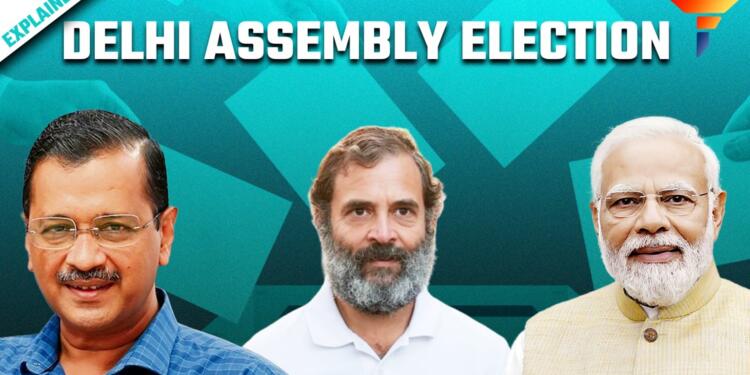The first major political battle ground in 2025 is the national capital, Delhi. The Election Commission has announced the dates of the polls where the ruling Aam Aadmi Party (AAP) is fighting to retain power against BJP, which has proved to be a worthy opposition, and Congress. As per the election schedule for Delhi Assembly elections, voting will take place in single phased manner on 5th February and counting will be underway on 8th February 2025.
Elections in Delhi had always been the game for Centre, irrespective of who ruled from there, until the anti-corruption movement drastically changed the political landscape with the entry of AAP. Since 2013, the Arvind Kejriwal-led government has been ruling the capital, while currently he is not the Chief Minister, he is still calling the shots in the party and thus in the governance of Delhi.
Strictly speaking, the emergence of AAP was based on the fact that it shunned the past parameters of politics and tried to create a new standard, at least what was visible back then. This gave it a dominating victory in two back to back elections. However, the number of seats reduced in the second election.
In 2015, AAP swept 67 seats leaving only 3 seats for the BJP. The results were intriguing and proved to be a research topic for political pundits as BJP stalwart and Prime Minister Narendra Modi was still the dominant face in India’s politics and particularly so in the National Capital.
Five years later, AAP retained power again but seats were reduced to 62. The vacuum of seats left in each election was occupied by the BJP.
Now as all the parties have upped the ante for the 2025 elections, it is essential to investigate the factors that are key to these elections and would decide the fate of all three political parties.
While earlier assembly elections saw AAP getting a cakewalk, this time it would certainly not be an easy fight with many developments indicating that the AAP Supremo is rattled with the strong opposition and counter of the buoyant BJP, which is coming out with renewed confidence following victories in Haryana and Maharashtra. And the RSS factor in this success is also playing on the minds of poll pundits, and reportedly on AAP as well.
Tracing the developments in past elections, the BJP has seen an upward trend in both number of seats and voting percentage. In the 2020 assembly election, BJP registered a spike of 6.21 per cent.
Besides, BJP has won all the Lok Sabha seats in the last three elections. The stark difference in voting pattern in Delhi in Lok Sabha and Assembly elections is a response to the Centre-UT tussle that clades the national capital. It makes apparent that despite the emergence of a strong Delhi-based party, voters have a clear idea about what they need from the NCT government and what they need from the Centre.
When it comes to Members of Parliaments, people don’t give weightage to basic amenities as in electing MLAs and state govt.
This is visibly seen to have been understood by PM Modi, who started his campaign by assuring the voters that no benefitting scheme would be closed after the BJP wins election.
This also resonates with the fact that without these beneficiary schemes, whatever BJP pulls, they can’t pull through. This is also evident by Arvind Kejriwal’s desperate back-to-back announcements like Mukhyamantri Mahila Samman Yojna, Sanjeevani Yojna and Pujari Granthi Samman Yojna.
With due consideration, these free schemes are something that have lured the voters and broke the traditional divisions of political perspective among them. But intensified emphasis on them this election hints that all is not well for AAP.
This is predominantly because the image of the ruling party has suffered a major hit due to the involvement of senior leaders in corruption cases.
The now-scrapped liquor policy scam and Sheesh Mahal controversy have degraded AAP’s and Kejriwal’s position to a level where any political party or leader stands.
Also Read: CAG flags 342% budget surge in Arvind Kejriwal’s Sheeshmahal Renovation
Besides, anti-Modi and opportunistics alliance politics have left no moral value to Delhi’s ruling party. Having an understanding of this reality, the BJP is leaving no arrow in its bow to hit the already declining credibility of AAP.
Another important issue in these Delhi assembly elections is the voter list and allegations around it. Both the parties have made their own case in front of the voters. While AAP has alleged that the BJP is getting its voters’ name deleted, BJP’s counteroffensive carries an unavoidable strong basis.
The BJP has for long accused AAP of harbouring Rohingyas and illegal Bangladeshi migrants. According to the BJP, these migrants easily get forged documents and voter IDs and vote for AAP because it turns a blind eye towards them while providing benefits of all freebies similar to voters of Delhi.
The timing may seem to be political but the residents of Delhi have felt the heat of it on ground. Illegal migrants is an unquestionable reality. Its ramifications are also well-known and who would they vote for is also predictable.
Recently, Delhi Police on the order of LG VK Saxena conducted a drive to identify such migrants and the number crossed to over one thousand five hundred in just a few days.
The police also busted a gang involved in making forged documents through websites and facilitating voter IDs. The police arrested many Bangladeshi nationals in recent days. It also revealed how an entire syndicate operates from infiltration to document facilitation.
The way IDs are being made in Delhi could easily swing the results of elections irrespective of what aspirations Delhi voters hold.
This is a serious issue that even core voters of AAP acknowledge. Their absorption among Delhi residents is so deep that even the education department had to issue directives to identify such children in both public and private schools. When such a big issue that carries importance to national security persists in Delhi, the ruling party is supposed to take whatever action it has authority to but all AAP did was throwing the ball in Centre’s court that it controls law enforcement.
However, there was more that could be done at NCT govt level, like what came from its own department of education was a measure taken by the secretary and no political decision was made on it, as sources tell.
The least AAP could have done is that it could have left petty politics and extended support to the action which was being taken. The reluctance of AAP on this crucial issue has not gone well among the voters who face the heat of it, as mentioned earlier.
To narrow it down, the things that went in favour of AAP were the freebies in the name of welfare schemes and clear differentiation of national and regional issues in the mindset of Delhi voters.
On both parameters, AAP is getting hit by the BJP. On freebies, the PM himself has assured that no such scheme would be stopped. Meanwhile, the illegal migrant issue has pressed voters to think beyond regional issues.
Therefore, the results of the upcoming assembly elections will largely depend upon to what extent the BJP would be successful to convey its position with respect to these issues.
As of now, it seems that BJP will perform well and the AAP will shrink further in terms of seats, but will the BJP be able to defeat AAP and form govt, only time will tell.
























